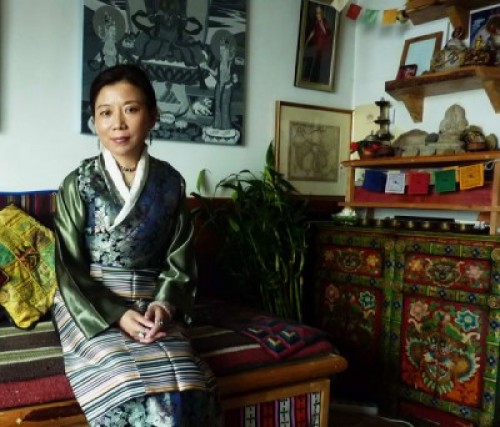Freedom of Speech Roundup
by Sampsonia Way / June 30, 2012 / No comments
In the Weekly Freedom of Speech Roundup Sampsonia Way presents some of the week’s top news on freedom of expression, journalists in danger, artists in exile, and banned literature.

In an interview below Tibetan writer Tsering Woeser (pictured) discusses the future of the Sino-Tibet dialogue. Photo: Courtesy of Tsering Woeser
This week shed light on attacks against journalists around the world: Irish journalist Eugene Moloney was murdered in an attempted robbery; the Journalistic Freedoms Observatory released a document detailing the deaths of three journalists in Iraq; and Mexican journalists are still in danger from the cartels. Still, better news comes from Syria, where writers are beginning to overcome the challenges of producing literature after the uprising.
Also presented are interviews with Jose Antonio Vargas and Lorella Praeli, both undocumented Americans, and Pankaja Thakur, an executive on the Censor Board of India.
Below are links to these and other relevant stories from June 20 to June 27, 2012.
Journalist Eugene Moloney Murdered as Attempted Robbery Goes Wrong in Dublin
Irish Central. “’It is a tragic irony that Eugene has died in an incident similar to many he would have recorded in his years working for the Evening Herald and the Irish Independent.‘” Read Here
Writing Towards Freedom in Syria
Syria Today. “Many writers argue that at this stage of general upheaval, writing is very difficult. The daily reality is too shocking, and may even call into question the meaning and significance of writing itself…” Read Here
The Youth, Women, and Woeser on the Future of Sino-Tibet Dialogue
Phayul.com. “…if the process gets resumed, what is the use of dialogue if there is no sincerity and no equality, which are the foundations for dialogue.” Read Here
Killing the Messenger: A New Book on the Death of American Journalist Chauncey Bailey
CPJ. Thomas Peele, author of Killing the Messenger, and CPJ senior adviser Frank Smyth sought justice for Chauncey Bailey, “the first journalist to be murdered in the United States in 14 years.” Read Here
Bill Dahl. An interview with Thomas Peele. Read Here
The Continuing Case of Julian Assange
Just Foreign Policy. Filmmakers, authors, and activists petition for WikiLeaks founder Julian Assange to receive political asylum. Read Here
Democracy Now speaks with Michael Ratner, president emeritus of the Center for Constitutional Rights and attorney for Julian Assange and WikiLeaks.
A Complicated Media, Crime, Drugs, and Politics in Guadalajara, Mexico
The New Yorker. “…there is the entirely justified fear of speaking to the press, particularly to foreign journalists… The reprisals that people are trying to avoid would come not only from crime groups but, in many cases, from factions within the Mexican government.” Read Here
On The Media. A compilation of audio stories about media and politics in Mexico, and the risks faced by journalists there. Listen Here
“Could You Please Look into the Camera” and Other Plays that Protest
Huffington Post. This slideshow features recent plays that use theater as a medium for protest against injustices. Read Here
A Conversation With: Film Censor Board Chief Executive, Pankaja Thakur
The New York Times. Pankaja Thankur discusses the policies and unpopular censorship decisions made by the Censor Board of India. Read Here
The Censor at Hong Kong’s Post
The Wall Street Journal. “Under Editor Wang Xiangwei, a once–revered source of China News has started to pull its punches.” Read Here
After Years of Struggle, DREAM Act Activists Hail Monumental Victory for Immigrants Living in Fear
Democracy Now. Journalist Jose Antonio Vargas and DREAM Act activist Lorella Praeli share their stories of growing up as undocumented youths in America. Read Here
Iraqi Government Treats Journalists’ Cameras as though They Were Car Bombs
Journalistic Freedoms Observatory. The JFO documents cases of death and violence among journalists and the Iraqi government’s continued attempts to limit freedom of speech from the past year. Read Here
Borders Statement on Banned Book Goes Viral
Asia One. Borders issued a statement in support of store manager Nik Raina Nik Abdul Aziz, who was “charged with distributing a banned book by controversial writer Irshad Manji.” Read Here




